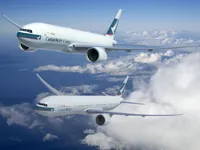
Cathay Pacific adds 12 new Boeing aircrafts to fleet
The new airplanes amounting to HK$25.6bn at list price stressed the airline’s commitment to operate a modern and efficient fleet.
Cathay Pacific Airways On Wednesday announced that it is continuing to make significant investments to modernise and grow its fleet, entering into an agreement with The Boeing Company to purchase four Boeing 777-300ER passenger aircraft and eight Boeing 777-200 Freighters.
The 12 new aircraft have a list price of about HK$25.6 billion but will be acquired at a considerable discount, as is the usual practice in such transactions. The aircraft are expected to be delivered to the airline between 2013 and 2016 and will be powered by General Electric GE90 engines.
The airline already operates 22 Boeing 777-300ERs on its key long-haul routes, and with the latest purchase will have another 28 on order for delivery up to 2015. The airline plans to retire the older aircraft in its fleet, including 21 Boeing 747-400s and 13 Airbus A340-300s, before the end of the decade as it progressively takes delivery of new-generation aircraft that will provide much greater fuel and operating cost efficiencies.
The Boeing 777-200F is a new aircraft type for Cathay Pacific and will be used to grow the freighter fleet and at the same time replace older, less fuel-efficient Boeing 747-400BCF Converted Freighters. For a typical 3,000 nautical mile trip, the 777-200F will burn 15% and 24% less fuel per payload tonne than the 747-400F and 747-400BCF respectively.
The new aircraft, which can fly 4,900 nautical miles with a full payload of 102 tonnes, will primarily be used on regional and European routes. The airline is also taking delivery of 10 new Boeing 747-8 Freighters, with the first two now scheduled to arrive in late September and another three being delivered by the end of 2011. The 747-8s, with a payload of nearly 130 tonnes, will be used almost exclusively on routes between Hong Kong and North America, according to a Cathay Pacific report.
Cathay Pacific currently has 21 wide-bodied freighters in its fleet, but two Boeing 747-400BCFs will be sold to the airline’s cargo joint venture with Air China (in addition to the two that have already been sold), while one or two more will be dry-leased to all-cargo subsidiary Air Hong Kong (two have already joined the AHK fleet). Following the arrival of the new purchases and the departure of the BCFs, Cathay Pacific’s freighter fleet will number up to 35 aircraft by 2016.
With the latest purchases, Cathay Pacific now has a total of 97 new aircraft, including 79 wide-body passenger and 18 freighter aircraft, on its books for delivery up to 2019. The value of these aircraft at list prices is almost HK$200 billion. These aircraft on firm order include: 28 Boeing 777-300ERs, 19 Airbus A330s, 32 Airbus A350-900s, 10 Boeing 747-8Fs and eight Boeing 777-200Fs.
Cathay Pacific Chief Executive John Slosar said: “We are very pleased to announce this latest Boeing order, which highlights our commitment to operating a modern and efficient fleet together with a deep commitment to our home city, Hong Kong. The Boeing 777-300ER is a superb aircraft that has already given a significant boost to our long-haul passenger operations, while the Boeing 777-200F will improve our freighter operations by delivering improved payload range capability at competitive operating costs.
“The Boeing 777-200Fs, together with the other new aircraft types, will provide us with exactly the right balance in our fleet portfolio through to the end of the decade along with a more efficient and environmentally friendly operation,” Mr Slosar said.
Along with its investments in new aircraft, Cathay Pacific is making a number of other major investments that will strengthen further Hong Kong’s role as a leading passenger and cargo hub. The airline is spending more than HK$1 billion on new products and services, including a new Business Class seat, from now to the end of the decade, and is also building a HK$5.5 billion cargo terminal at Hong Kong International Airport which is due to begin operations in early 2013.








![Cross Domain [Manu + SBR + ABF + ABR + FMCG + HBR + ]](https://cmg-qa.s3.ap-southeast-1.amazonaws.com/s3fs-public/styles/exclusive_featured_article/public/2025-01/earth-3537401_1920_4.jpg.webp?itok=WaRpTJwE)









 Advertise
Advertise


